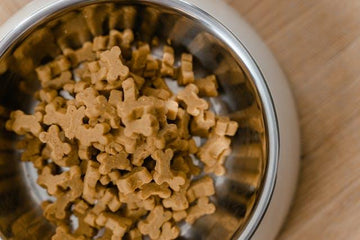Introduction
Ever wondered what goes into that bag of dog food you regularly pick up from the store? Our furry companions depend on us for their nutrition, and it's our duty to ensure they get the best. Dive in to discover the world of dog food and how it impacts your beloved pet's health.
The Evolution of Dog Food
Remember when dogs would just eat leftovers? Those days are long gone. As we learned more about canine nutrition, the pet food industry evolved. No longer just table scraps, today's dog food is a complex blend designed to meet every canine's specific needs.
Components of Quality Dog Food
Just like humans, dogs need a balanced diet. Protein, fats, vitamins, minerals—each plays a unique role. And when it comes to ingredients? Opt for foods with recognizable ones, like chicken, beef, or vegetables, rather than ambiguous terms like "animal by-products."
Types of Dog Food
Ever been overwhelmed by the choices in the pet food aisle? Let's break it down:
- Dry kibble: Great for dental health but can be less flavorful.
- Wet or canned food: Delicious, but watch out for fillers.
- Homemade meals: Perfect if you have the time and knowledge.
- Raw diets: Controversial, but some swear by its benefits.
Choosing the Right Dog Food for Different Life Stages
Did you know puppies need different nutrients than seniors? As dogs age, their nutritional needs change. Ensure you're feeding them appropriately to keep them at their best.
Specialized Diets and Their Importance
Some dogs need a bit more attention when it comes to their diet. Whether it's for weight control, allergies, or a specific medical condition, there's likely a dog food out there tailored for their needs.
The Organic and Natural Dog Food Trend
With the rise of organic foods for humans, it's no surprise our pets are getting in on the action. But what does "organic" really mean in dog food? And is it better?
Reading and Understanding Dog Food Labels
Ever tried to read a dog food label? It can be confusing! Learn the key terms and watch out for those red flags. Your pup's health might just depend on it.
The Role of Supplements in a Dog's Diet
Fish oils, glucosamine, probiotics – the list goes on. Supplements can be beneficial, but they're not always necessary. It's essential to know when to give them and why.
Homemade vs. Store-Bought: The Debate
Some swear by homemade dog food, while others trust established brands. Whichever side you're on, it's all about what's best for your furry friend.
The Environmental Impact of Dog Food Production
Our choices impact the planet. Ever thought about the footprint of your dog's food? Some brands are striving for a greener paw print.
Common Myths and Misconceptions About Dog Food
No, dogs aren't just carnivores, and no, grains aren't always bad. Let's debunk some of those dog food myths together.
Tips for Switching Dog Foods Safely
Change can be hard, especially on a dog's stomach. If you're considering a switch, do it gradually and watch for any signs of distress.
Conclusion
Your dog's nutrition plays a pivotal role in their overall health and well-being. Whether you're a new dog parent or a seasoned pro, continuously educate yourself about dog food. Remember, a well-fed dog is a happy dog!
FAQs
-
Is grain-free dog food better?
While some dogs benefit from grain-free diets due to allergies, it's not necessary for all. -
How often should I switch dog foods?
Only when necessary. If you do, transition slowly over a week or two. -
Can dogs be vegetarians?
Technically, yes. But it's crucial to ensure they get all essential nutrients. -
What's the deal with raw diets?
Some believe raw diets mimic a dog's natural diet, but they can also pose health risks. -
How can I tell if a dog food brand is trustworthy?
Research, read reviews, and consult with your veterinarian.





